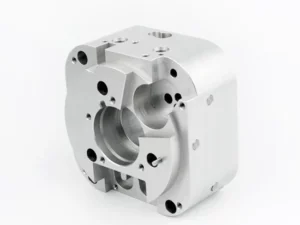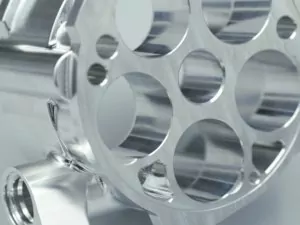Can CNC Machining Parts Improve Product Quality and Efficiency

In today’s highly competitive manufacturing landscape, companies must constantly seek ways to enhance their production processes, deliver superior products, and boost operational efficiency. Xilici Company (XLC), a leading provider of precision engineering solutions, has been at the forefront of adopting advanced technologies such as CNC machining. But the question remains: can CNC machining parts truly improve product quality and efficiency? In this article, we explore the transformative impact of CNC machining, with insights from XLC’s extensive industry experience.
Understanding CNC Machining and Its Relevance
CNC (Computer Numerical Control) machining refers to the automated control of machining tools by means of computers executing pre-programmed sequences of machine control commands. Unlike manual machining, CNC machining allows for highly precise and consistent production of parts, making it indispensable in modern manufacturing.
3d printing
production mold making
cnc machining
rapid prototyping services
At Xilici Company, CNC machining has become the backbone of their production line. By leveraging state-of-the-art CNC equipment, XLC delivers components with unmatched accuracy, repeatability, and efficiency. This technology is especially vital for industries where tolerances are tight and quality is non-negotiable, such as aerospace, automotive, and medical device manufacturing.
The Direct Impact of CNC Machining on Product Quality
One of the primary benefits of CNC machining parts is the dramatic improvement in product quality. CNC machines operate with exceptional precision, often achieving tolerances as tight as a few microns. This level of accuracy ensures that every part produced meets stringent specifications and quality standards.
XLC has witnessed firsthand how CNC machining reduces the risk of human error, leading to fewer defects and higher-quality finished products. The automated nature of CNC processes allows for complex geometries and intricate designs that would be difficult or impossible to achieve with manual methods. This capability is particularly valuable in the production of custom parts or prototypes, where consistency and precision are paramount.
- Consistency: Every part produced is virtually identical, reducing variability and ensuring uniformity across large production runs.
- Surface Finish: CNC machining offers superior surface finishes, minimizing the need for secondary operations like polishing or grinding.
- Material Versatility: CNC machines can work with a wide range of materials, including metals, plastics, and composites, expanding the possibilities for innovation.

Boosting Efficiency Through CNC Machining
Efficiency is another area where CNC machining excels. Automated processes mean faster production times and reduced labor costs. For XLC, the adoption of CNC technology has resulted in shorter lead times, increased throughput, and the ability to scale production rapidly in response to customer demand.
CNC machining parts also enable just-in-time manufacturing, minimizing inventory costs and reducing waste. The digital nature of CNC programming allows for quick adjustments and design changes, making it easier to respond to market trends or customer feedback.
- Reduced Setup Time: CNC machines can be programmed and set up quickly, allowing for rapid changeovers between different jobs.
- 24/7 Operation: Automated systems can run continuously with minimal supervision, maximizing productivity.
- Lower Error Rates: Automation reduces the likelihood of mistakes, leading to less rework and scrap.
Industry Trends: The Role of CNC Machining in Modern Manufacturing
Across the manufacturing sector, the adoption of CNC machining parts is accelerating. According to industry reports, the global CNC machine market is expected to reach over $100 billion by 2028, driven by the demand for high-quality, complex components in sectors such as electronics, defense, and renewable energy.
Companies like Xilici Company are investing heavily in advanced CNC technologies, including multi-axis machining, automated tool changers, and real-time monitoring systems. These innovations are not only enhancing product quality and efficiency but also enabling greater flexibility and customization for clients.
Moreover, the integration of CNC machining with other digital technologies—such as CAD/CAM software and IoT-enabled sensors—is paving the way for smart manufacturing. This convergence allows for predictive maintenance, real-time quality control, and data-driven decision-making, further optimizing production processes.
Related Keywords: Precision Engineering and Custom Machining
As the demand for high-precision components grows, the importance of precision engineering and custom machining cannot be overstated. Precision engineering ensures that every part meets exact specifications, while custom machining allows for tailored solutions that address unique customer requirements.
At XLC, these two keywords are integral to their value proposition. The company’s expertise in precision engineering enables them to deliver parts that perform flawlessly in critical applications, while their custom machining capabilities allow for rapid prototyping and small-batch production tailored to client needs.
Case Study: XLC’s Success with CNC Machining
To illustrate the real-world benefits of CNC machining, consider a recent project undertaken by Xilici Company for a leading medical device manufacturer. The client required a series of complex, high-tolerance components for a new surgical instrument. Traditional manufacturing methods were unable to meet the required specifications within the desired timeframe.
By employing advanced CNC machining parts, XLC not only achieved the necessary precision but also reduced production time by 40%. The result was a high-quality product delivered ahead of schedule, enabling the client to accelerate their go-to-market strategy and gain a competitive edge.

Challenges and Considerations
While the benefits of CNC machining are substantial, it is important to acknowledge the challenges involved. Initial investment in CNC equipment can be significant, and skilled operators are required to program and maintain the machines. However, as XLC’s experience shows, the long-term gains in quality and efficiency far outweigh the upfront costs.
Furthermore, ongoing advancements in CNC technology are making these systems more accessible and user-friendly, lowering the barrier to entry for companies of all sizes.
Conclusion: The Future of Manufacturing with CNC Machining
In summary, CNC machining parts have a profound impact on both product quality and operational efficiency. For companies like Xilici Company (XLC), embracing CNC technology has been a game-changer, enabling them to deliver superior products, respond quickly to market demands, and maintain a leadership position in the industry.
As manufacturing continues to evolve, the role of CNC machining—along with precision engineering and custom machining—will only become more vital. By investing in these technologies, companies can ensure they remain competitive, innovative, and capable of meeting the ever-increasing demands of the modern marketplace.
| Benefit | Description |
|---|---|
| Improved Quality | High precision and consistency in every part produced |
| Greater Efficiency | Faster production times and reduced labor costs |
| Flexibility | Easy adaptation to custom requirements and quick design changes |
| Industry Leadership | Ability to meet the demands of advanced sectors like aerospace, medical, and automotive |
For manufacturers looking to enhance their operations, CNC machining is not just an option—it is a necessity. And with industry leaders like XLC driving innovation, the future of manufacturing looks brighter than ever.
